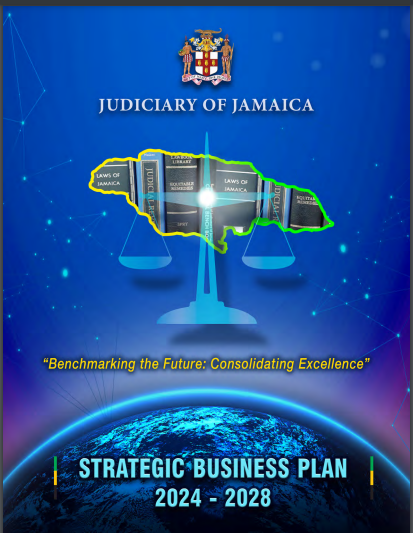You are here
Grey, Gerald v Dist. Cons. Esson and The Attorney General
IN THE SUPREME COURT OF JUDICATURE OF JAMAICA
IN COMMON LAW
SUIT NO. C.L. 1992lG229
BETWEEN GERALD GREY PLAINTIFF
A N D DIST. CONS. ESSON FIRST DEFENDANT
A N D THE ATTORNEY GENERAL SECOND DEFENDANT
Mr. Marcus Goffe for Plaintiff.
Miss Susan Reid-Jones for Defendants
Instructed by The Director of State Proceedings.
Heard: sthan d llthO ctober, 2002
Brooks, J.
The Defendants herein have applied for the Court to exercise its
inherent jurisdiction of controlling its own procedure, to have the action
bought by the Plaintiff against them, struck out. This step, they say, ought to
be taken because of the delay by the Plaintiff in prosecuting the action.
The action is one in which the Plaintiff seeks damages for malicious
prosecution and false imprisonment arising fiom an incident occurring in
1992 between himself and the First Defendant who is a District Constable.
The Defendants say that the delay has been manifest in the fact that
although over ten years have passed the action has not yet been tried. It had
been filed in November 1992 and placed on the cause list after pleadings
were closed. The record shows that the action came on for trial in
November 1995 but was removed from the Cause List when the Plaintiff
failed to attend for the trial.
Since that time, the Defendants say, there have been some halfhearted
steps taken by the Plaintiff in the action by filing and continually reissuing
summonses to enlarge time in which to set down the matter on the
c; Cause List. These steps were never properly prosecuted and the action has
- . .. ,< . - -
up1 to today's date not been restored to the Cause List.
The delay, the Defendants say, has been inordinate and inexcusable
and has caused them prejudice because, to quote from the Affidavit of Susan
Reid-Jones in support of the Defendant's application, "it is llkely that
memories of the event will fade , a.n d witnesses will disappear by the time the
matter, should come on for hearing" and also "that there is therefore a
0 sulbstantial risk that there cannot be a fair trial of the matter."
No specifics were provided to support these allegations of prejudice
but-Crown Counsel has candidly admitted that the First Defendant was still
a~~ailabalned was still in the employ of the Crown.
The Plaintiff on the other hand says that the delay has not been as a
result of any willful act on his part. He has given affidavit evidence to show
that he attempted to have h s previous lawyers prosecute the matter and even
solicited the assistance of the General Legal Council in that regard. He also
says that the application to enlarge time (previously mentioned) was stymied
as a result of the Court's file not being available at the various and many
dates of hearing. In this regard he is relying on information received from
his previous lawyers. Some of that illformation unfortunately is not
su.pported by the records on the Court's file, which show that the file was
,
unavailable on only one occasion (19/12/00).
- -
The Plaintiff also asserts that not only does he have a good excuse for
the delay in prosecuting the matter but that the Defendants have failed to
provide any detail as to the prejudice fiom which they claim to be suffering.
Applications of this nature are to be considered against the well
established test summarized in the case of Birkett v. James [I9771 2 ALL
ER 801 at page 805 where Diplock L. J. stated.
"The power (to strike out) should he exercised only
where the Court is satisfied (1) that the default has been
intentional and contumelious, e.g. disobedience to a
peremptory order of the court or conduct amounting to
an abuse of the process of the Court; or (2) (a) that there
has been inordinate and inexcusable delay on the part of
the plaintiff or his lawyers, and (my emphasis) (b) that
such delay will give rise to a substantial risk that it is
not possible to have a fair trial of the issues in the action
or is such as is likely to cause or to have caused serious
prejudice to the defendants either as between
themselves and the plaintiff or between each other or
between them and a third party."
In his submission resisting the application, counsel for the Plaintiff
also proffered the interesting submission that this is an action which
involves allegations of abuse by agents of the state. He says that the Court
sl-lould be slower in these circumstances to strike out the Plaintiffs claim as
the state has a "higher accountability" in actions brought against it by
citizens.
c-, No authority was provided for this submission but counsel pointed by
-
analogy to what, he says, is a higher standard used in the cases of abuse of
state power in the matter of exemplary damages. - -
I, in the absence of authority which supports this novel submission,
antd upon consideration of it, cannot accept that the Crown is to be dealt
wiith on a different standard on the issue of the production of witnesses and
the integrity of their respective memories, than any ,other employer.
0 In assessing the application I have commenced with the principle
that, Justice sits more securely for Plaintiff and Defendant when both have
had their day in Court and the issues litigated as decided on their merits.
I have also borne in mind the following principles.
(1) The rules outlined in Birkett v James (supra) arose in the
context an attempt by the High Court of England to correct
the situation where the dilatory conduct of proceedings in that
Court "had become a scandal" per Lord Diplock (Binkett per
(supra) at page 804 d.)
(2) In Allen v. Sir Alfred McAlpine & Sons [I9681 1 ALL ER 543
Lord Denning M. R. in dealing with the issue said at p.547
"The principle on which we go is clear,
when the delay is prolonged and
inexcusable and is such as to do
injustice to one side or the other, or to both,
the Court may in its discretion dismiss the
action straight away, leaving the plaintiff to
his remedy against his own solicitor who
has brought him to this plight."
- --
(3) In our own jurisdiction in the case of Vashti Wood vs. H. G.
Liquors and Anor. SCCA 23/93 (delivered 7/4/95) Wolfe JA,
as he then was, said:
"I make bold to say, plagued as our Courts
are with inordinate delays, this court must
C, develop a jurisprudence which addresses our
- peculiar situation."
Based on the affidavit evidence presented to me I find that
-
(a) the delay of seven years by the Plaintiff in having the action
returned to the Cause List is undoubtedly inordinate,
particularly as I am firmly of the view that the incorrect
procedure was being adopted by the Plaintiffs attorneys.
(b) although the Plaintiff himself was at all times interested in
having the matter tried the approach by his attorneys was not in
keeping with that interest and the delay which resulted was
inexcusable.
(c) the delay will result in the prejudice to a fair trial. Whereas the
Plaintiff may have the incident clearly etched in his mind, the
C) witnesses for the Defendants would be the First Defendant and
- - -
perhaps the other two police officers mentioned by the Plaintiff
,
.- in his affidavit. These officers would quite probably over the
past ten years have been involved with a number of arrests
resulting in a blurring of the details of any particular one of this
vintage in their memories. In those circumstances I find that
the Defendants will be. at a disadvantage in clearly having the
incident recounted by their witnesses. Even, as the Plaintiffs
counsel has suggested was possibly the case, if they had
statements with which to refresh their memories, the lapse of
ten years (and most likely twelve if the matter were allowed to
go to trial), would prevent the recollection of the sharp detail
required to impress a tribunal as to fact.
It has been held in the cases of West Indies Sugar v Minnell
1993 30 JLR 542 and in the Vashti Wood case that inordinate delay by itself
can be relied on to show prejudice. I am satisfied that prejudice has been
demonstrated in the instant case.
It is therefore ordered that:
1. This action be dismissed for want of prosecution.
2. Costs of the application and costs incurred in the action be the
Defendants to be taxed if not agreed.










